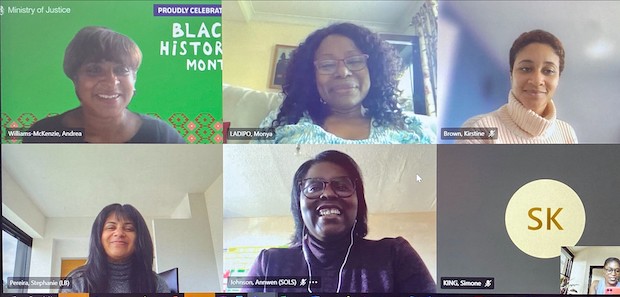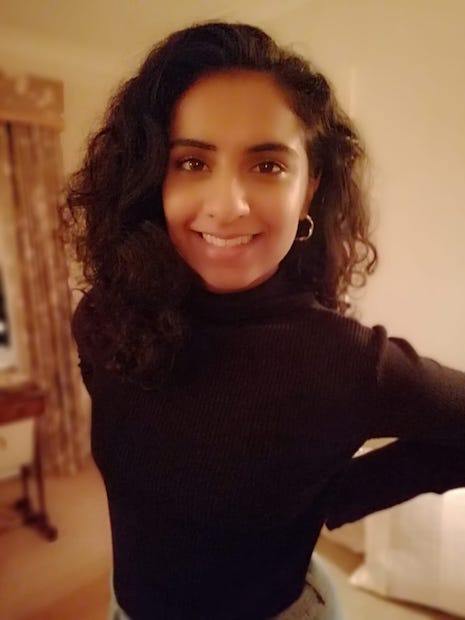Civil Service
|
|
Civil Service Year of Inclusion: What inclusion means to me...Rohini Aggarwal
Blog posted by: Rohini Aggarwal, Department for International Trade, Co-founder of the Ethnic Minority Women’s Forum, 24 November 2020 – Categories: Diversity and inclusion, Good management, Uncategorized.

Mentoring session led by Andrea Williams-McKenzie and attended by Jennifer Sprott (EMWF's talent lead), Monya Ladipo, Kirstine Brown, Stephanie Pereira, Annwen Johnson and Simone King
To me, inclusion means being seen for the skilled Civil Servant I am. It means not being reduced to the colour of my skin, my gender, or the combination of both.

Rohini Aggarwal, Department for International Trade, Co-founder ofthe Ethnic Minority Women’s Forum
For this blog, I have been asked to focus on gender. But I cannot talk about gender without discussing race, the two making me who I am, but also informing how I am perceived by the world, and how I experience the world.
Struggles are diverse
Considering intersectionality in gender inclusion is vital, though often overlooked. It means recognising the multiple aspects of a person which may advantage or disadvantage them- so taking into account class, gender, race, disability and so forth, recognising that people are not one-dimensional. I am a brown woman and have faced sexism and racism inside and outside the workplace. But I am also privileged due to my class and able body. Intersectional feminism, therefore, requires you to listen to and advocate for all women - whose struggles are diverse and wide-ranging.
This year, myself and three colleagues, Aqsa Hussain, Ella Graham Goodman and Natasha Khadka, set up the cross-government Ethnic Minority Women’s Forum (EMWF), a network which aims to create a safe space and development opportunities for ethnic minority women, while educating our allies to improve the outcomes and experiences of ethnic minority women in the Civil Service.
Pause for reflection
While we love working for the Civil Service, there have been some instances which have caused pause for reflection that some will not be able to see beyond our gender and skin colour. Aqsa and I, for example, have been consistently mixed up by colleagues, many who worked closely with us, to which management responded: ‘they need to make themselves better known’.
Not only did this behaviour not get challenged in the workplace, but the responsibility to move forward was put on us. While such incidents arise because of our gender as well as our race, it’s acutely apparent that we are not always afforded the same respect as other colleagues. This is where highlighting intersectionality is so important.
Improvements have been made
The data shows us that improvements have been made. Gender parity in the Civil Service is further ahead than race equity. In 2019, the Civil Service was made up of 53.9% women overall, and 45.2% of Senior Civil Servants were women. In comparison, while 12.7% of the Civil Service were of an ethnic minority (mapping closely to 13% of the UK’s working population), only 6.3% of Senior Civil Servants are an ethnic minority.
There’s still more to do
Understanding the overlap of race and gender would provide an improved understanding of how far we have come and yet to go. For example, understanding just how many of the ethnic minority Senior Civil Service are female and differentiating the BAME terminology to understand better the barriers facing different minority groups.
Throughout October for Black History Month 13 Black female Senior Civil Servants volunteered their time to each mentor a group of Ethnic Minority Women’s Forum black members. It enabled us to offer 65 mentees the opportunity to connect with a Senior Civil Servant who looked like them and could relate to them and their professional experiences, leaving many mentees feeling ‘empowered’ and ‘motivated’ (their words, not ours).
With an initial ambition to reach 50 ethnic minority women across three or four government departments, the forum has grown significantly. Now three months later, it is 620 women strong across almost all departments and arm’s length bodies - and it is still growing at a phenomenal rate.
Affirming
This increasing number, and the affirming feedback we have received from our members, demonstrates how much this forum was needed, how long it is overdue, and how many ethnic minority women feel marginalised at work.
If you identify as an ethnic minority woman and would like to find out more about the cross-government Ethnic Minority Women’s Forum, please email rohini.aggarwal@trade.gov.uk and aqsa.hussain@defra.gov.uk.
Hearing loss and Covid: Simon’s and Sue’s experience
Original article link: https://civilservice.blog.gov.uk/2020/11/24/civil-service-year-of-inclusion-what-inclusion-means-to-me-rohini-aggarwal/


.png)